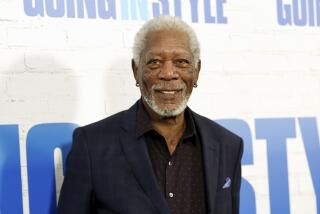Not ‘other,’ just black
- Share via
The month of February saw one victory after another in the astonishing, historic ascent of Barack Obama as a presidential contender. It seemed like perfect timing to me -- Obama marched steadily toward the ultimate political prize week after week during Black History Month. But that’s not an association people seem terribly eager to make.
In fact, the closer Obama gets to representing us all, the more people struggle with the notion of him as a black man -- reflecting in growing detail America’s chronic schizophrenia about racial identity.
The question of race that has been raised repeatedly in Obama’s campaign is both straightforward and existential: Is he really black? Isn’t he really biracial? Or maybe post-racial, even nonracial? A writer for Salon.com, analyzing a swing through Kansas during which Obama lauded the relatives on his white mother’s side, delved into why Obama wasn’t playing up that part of his heritage and embracing his “inner diversity”; “Can America elect a zebra?” the piece asked. Another admiring Salon article credited Obama for taking the path to a “post-racial destination” -- but also for the bold move of “making himself black.”
Such deconstruction speaks less to any new racial enlightenment than it does to old, deep-seated racial prejudice. The core of the resistance to seeing Obama as what he is -- a black man -- even among his supporters (or perhaps especially among his supporters) is an assumption that he is capable and successful because he is “other.” Beneath the post-racial talk and the how-black-is-he speculation lies an antebellum belief that blackness is inherently limiting, while whiteness is inherently transcendent. (Blackness is, however, inherently good for style and “soaring” oratory, qualities the media have been quick to attribute to Obama.)
In the American racial caste system, the more refined and well-spoken a black person is, the more mixed that person is assumed to be. There is some hard historical truth to that: Better-off blacks were often clearly mixed race, the descendants of slave masters and other whites who consorted with black women and gave their children “white” privileges like schooling.
But that privilege only went so far. Modern discussions about race as a matter of personal choice, which have reached new heights with Obama mania, willfully ignore the fact that America has always treated its half-black citizens as simply black -- and it still does. That means that although Obama or W.E.B. DuBois or Booker T. Washington may be lighter-skinned than, say, Jesse Jackson or Marcus Garvey, they are no more likely to be accepted as white.
Most African Americans are mixed with whites, thanks to miscegenation that’s been going on for centuries. My family, for instance, is Creole from New Orleans, a racial melange of black, European and American Indian that practically defines “other.” But Creoles inspired not a sense of racial liberation but racial anxiety; determined to maintain the color line at all costs, whites enforced the “one-drop” rule and sent people like me to the back of the streetcar. Such has always been the social reality for blacks, whatever their degree of whiteness. If all African Americans declared ourselves multiracial today -- 10% white, or 20% or 50% -- that reality wouldn’t change one whit.
Some argue that focusing on Obama’s mixture exactly addresses this point -- that it’s time to change an outdated paradigm. They say a big part of the hope and change Obama represents is an opportunity to upend the “one-drop” and redefine race altogether, to give America a fresh start. But such redefinition is not the politics of change; it’s the politics of forgetting. Casting Obama as post-black is pure symbolism that conveniently fuzzes the many race-specific problems -- incarceration, joblessness -- that affect masses of black men, many of whom look a heck of a lot like Obama.
Let’s face it, change is hard. It can be ugly. It’s not about conciliation but confrontation. And what must be confronted is Obama’s blackness, not his whiteness or some notion that he transcends race altogether. America should be able and willing to elect a black man to the White House, which might qualify as the biggest sea change -- and no small reason for hope -- in our political history.
We should be permanently retiring the one-drop rule, not by trumpeting a new multiculturalism or a new post-racialism but by acknowledging that it is indeed possible for somebody to be both unequivocally black and representative of other fellow Americans.
That’s a lesson that’s taken far too many election cycles to learn. Whatever happens with Obama’s campaign now, let’s hope it’s at least taught us that.


